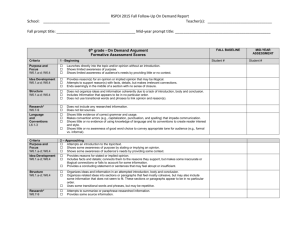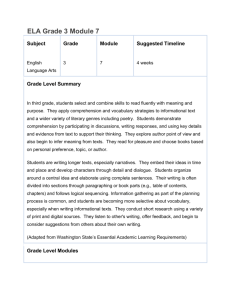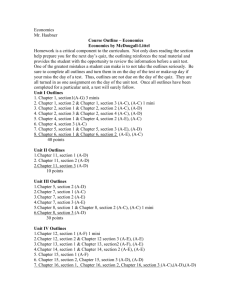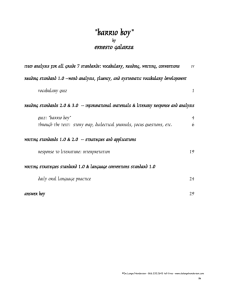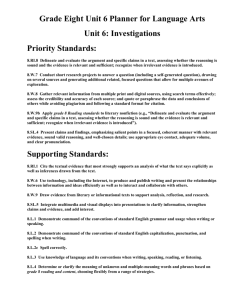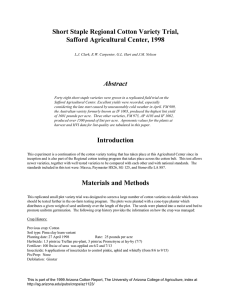Course Outline - Paradise High School
advertisement
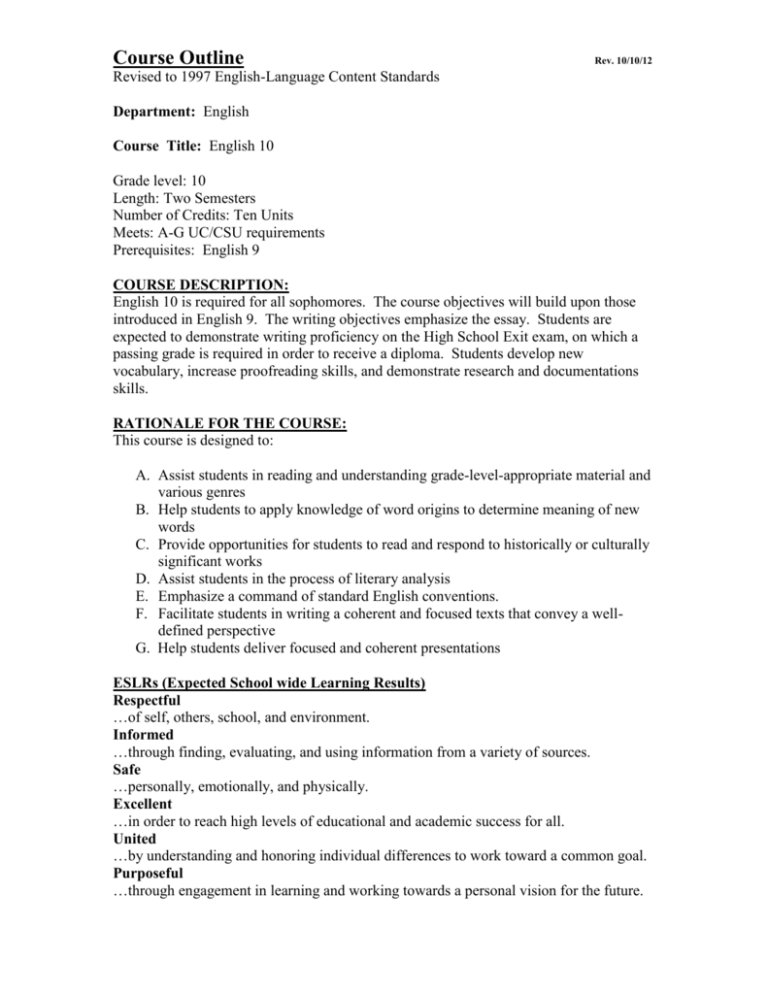
Course Outline Rev. 10/10/12 Revised to 1997 English-Language Content Standards Department: English Course Title: English 10 Grade level: 10 Length: Two Semesters Number of Credits: Ten Units Meets: A-G UC/CSU requirements Prerequisites: English 9 COURSE DESCRIPTION: English 10 is required for all sophomores. The course objectives will build upon those introduced in English 9. The writing objectives emphasize the essay. Students are expected to demonstrate writing proficiency on the High School Exit exam, on which a passing grade is required in order to receive a diploma. Students develop new vocabulary, increase proofreading skills, and demonstrate research and documentations skills. RATIONALE FOR THE COURSE: This course is designed to: A. Assist students in reading and understanding grade-level-appropriate material and various genres B. Help students to apply knowledge of word origins to determine meaning of new words C. Provide opportunities for students to read and respond to historically or culturally significant works D. Assist students in the process of literary analysis E. Emphasize a command of standard English conventions. F. Facilitate students in writing a coherent and focused texts that convey a welldefined perspective G. Help students deliver focused and coherent presentations ESLRs (Expected School wide Learning Results) Respectful …of self, others, school, and environment. Informed …through finding, evaluating, and using information from a variety of sources. Safe …personally, emotionally, and physically. Excellent …in order to reach high levels of educational and academic success for all. United …by understanding and honoring individual differences to work toward a common goal. Purposeful …through engagement in learning and working towards a personal vision for the future. COURSE OUTLINE: In meeting the State of California benchmarks, the following pieces of literature and writing will be taught. In addition, this course will address various standards from the following areas: vocabulary and word development, reading comprehension, language conventions, literary response and analysis, and speech. English 10 (SCOPE AND SEQUENCE) Areas of Study Required Writing Applications (2.0) and Strategies (1.0) I. Observational/Descriptive Essay Reading-Word Analysis, Fluency, and Vocabulary (1.0) Writing Strategies (1.0) Written and Oral English Language Conventions (1.0) II. Persuasive Essay/Research Paper (2.3, 2.4) Reading Comprehension-Focus on Informational Mat. (2.0) Writing Strategies (1.0) Writing Applications- (2.0) Written and Oral English Language Conventions (1.0) Listening and Speaking Strategies (1.0) Speaking and Applications (2.0) III. Literary Analysis (2.2) and Response to Literature (3.0) Reading – Word Analysis, Fluency, and Vocabulary (1.0) Literary Response and Analysis (3.0) Writing Strategies (1.0) Writing Applications (2.0) Written and Oral English Language Conventions (1.0) Speaking and Applications (2.0) Standards by Number 1.1 1.2, 1.9 1.1-1.5 2.3, 2.5 1.1-1.9 2.3 a-d, 2.4 a-c 1.1-1.5 1.1, 1.4-1.9, 1.11, 1.12 2.2 a-e, 2.5 a, c, d 1.1-1.2 3.1-3.12 1.1-1.2, 1.4, 1.9 2.2 a-d 1.1-1.4 2.4 a-d Required Reading Standards (1.0, 2.0 and 3.0) -Word Analysis, Fluency, and Systematic Vocabulary Development (1.1 – 1.3) are done through the approved Core Literature and Major Units of Study. -Reading Comprehension (2.1 – 2.8) and Literary Response and Analysis (3.1-3-12) are done through the approved Core Literature and Major Units of Study as well as Required Writing Applications (2.0) and Strategies (1.0). Required Written and Oral English Language Conventions All standards (1.1 – 1.5) are done through the approved Core Literature and Major Units of Study Listening and Speaking Standards and Applications (1.0 and 2.0) Certain standards are done along with the approved Writing Applications (2.0) and Strategies (1.0) and Approved Core Literature and Major Units of Study Approved Core Literature and Major Units of Study I. Of Mice and Men (Fall Semester) Reading – Word Analysis, Fluency, and Vocabulary (1.0) Reading Comprehension – Focus on Informational Mat. (2.0) Reading – Literary Response and Analysis (3.0) Writing Applications (2.0) Written and Oral English Language Conventions (1.0) Speaking and Applications (2.0) II. To Kill a Mockingbird (Fall Semester) Reading – Word Analysis, Fluency, and Vocabulary (1.0) Reading Comprehension-Focus on Informational Mat. (2.0) Reading – Literary Response and Analysis (3.0) Writing Strategies (1.0) Writing Applications (2.0) Standards by Number 1.1-1.2 2.3, 2.5, 2.7, 2.8 3.2-3.9, 8.3.7, 3.11, 3.12 2.2 a-d 1.1-1.4 2.4 a-d, 2.6 a-c 1.1-1.2 2.3, 2.5, 2.7, 2.8 3.2-3.9, 8.3.7, 3.11, 3.12 1.1-1.5, 1.9 2.2 a-d, 2.3 a-c Written and Oral English Language Conventions (1.0) Speaking and Applications (2.0) III. Night (Spring Semester) Reading – Word Analysis, Fluency, and Vocabulary (1.0) Reading Comprehension-Focus on Informational Mat. (2.0) Literary Response and Analysis (3.0) Writing Strategies (1.0) Writing Applications (2.0) Written and Oral English Language Conventions (1.0) Listening and Speaking Strategies (1.0) Speaking and Applications (2.0) IV. Macbeth (Spring Semester) Reading – Word Analysis, Fluency, and Vocabulary (1.0) Literary Response and Analysis (3.0) Writing Applications (2.0) Listening and Speaking Strategies (1.0) Speaking and Applications (2.0) V. Language of Literature – McDougall Littell Textbook -Various Short Stories, Drama, and Poetry (Fall or Spring Semester); Videos such as: Macbeth, To Kill a Mockingbird, Of Mice and Men, YouTube clips, and Oprah Winfrey’s Interview with Elie Wiesel. SUGGESTED TEACHING STRATEGIES: I. II. III. IV. V. VI. VII. Lecture Cooperative learning groups Investigations/research Students explanations and presentations Modeling Peer revision Organizational strategies using class folders/notebooks ASSESSMENTS I. Oral questions/answers II. Written quizzes and examinations III. Portfolio assignments IV. Pre- and post-grammar testing V. Student Projects 1.1 2.4 a-d 1.1-1.2 2.1, 2.3-2.8 3.2-3.9, 8.3.7, 3.11-3.12 1.1-1.5, 1.9 2.2 a-d, 2.3 a-d 1.1-1.5 1.1, 1.2, 1.4-1.9, 1.11, 1.12 2.2 a-e, 2.4 a-d, 2.6 a-c 1.1-1.2 3.1-3.8, 3.10, 8.3.7, 3.11-3.12 2.2 a-d 1.1, 1.9, 1.11 2.4 a-d Various standards are covered depending on the story (See Exit Standards Manager)

